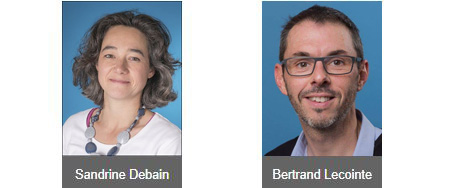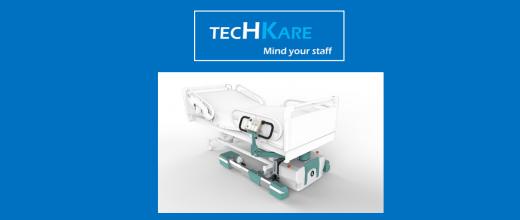11.03.2022
6 minutes of reading
Intrapreneurship offers a middle way between entrepreneurship and being a salaried worker. Aware of the possibilities this approach offers in terms of reinforcing the links between research and the industrial and economic sector, IFPEN has made it an innovation accelerator to address the challenges of the ecological transition.
TecHKare: the idea of two IFPEN employees
 For IFPEN’s 2018 Innovation Challenge, Bertrand Lecointe and Sandrine Debain, two employees with very different backgrounds – one is a mobility project manager and the other works in human resources – came up with the idea for a solution making it easier to move heavy loads in hospitals.
For IFPEN’s 2018 Innovation Challenge, Bertrand Lecointe and Sandrine Debain, two employees with very different backgrounds – one is a mobility project manager and the other works in human resources – came up with the idea for a solution making it easier to move heavy loads in hospitals.
As winners of the challenge, they were given access to IFPEN’s resources (time and testing facilities) to study the technical feasibility of their idea and verify its market potential.
From value proposal to industrial product, via the MVP (Minimum Viable Product) phase and the creation of different proofs of concept (POC)*, it took three years to finalize the OwlOne solution, a dedicated personal assistant to take the strain off stretcher bearers and protect them from musculoskeletal disorders. As the project advanced, the idea for a company took shape. TecHKare was created in 2021 to assemble and market OwlOne.
>> Find out more about TecHKare
* The different stages of “Design Thinking”, a methodology consisting in designing a product or service oriented towards the customer’s needs and that the IFPEN incubator teaches its researchers who want to become entrepreneurs.
How did TecHKare come about? How does this example illustrate a form of entrepreneurship that is particularly interesting in terms of addressing the challenges of the expected societal transformation?
IFPEN employees, innovation relays serving the energy transition
A technological research center, IFPEN is positioned at the crossroads of fundamental research and applied research. Consequently, from basic research to innovation, IFPEN employees like Bertrand Lecointe and Sandrine Debain can play a role, attentive to the needs of the market and in a position to propose the appropriate technological solutions. They can be likened to “relays”.
| The innovation challenge: what exactly does it consist of? |
|
IFPEN regularly organizes a challenge open to employees, IFP School students and employees of IFPEN Group subsidiaries, aimed at stimulating the company’s innovation culture. In 2021, all five winning projects from the 2020 challenge were able to make progress: for several of them, testing and POC led to a partnership with an SME or an industrial group, or patents being filed. Alongside, a so-called “free creativity” approach is focused on the development of new skills, methodologies and experimental or digital tools. |
|
|
Thanks to its spin-off system, IFPEN can enable project leaders like Bertrand Lecointe to create a startup. Alongside government mechanisms, it is a powerful tool that gives researchers time to “de-risk” their project.
Thanks to the promotion of a strong entrepreneurial culture, IFPEN enables its researchers and employees to put their ideas to the market test and play the role of innovation relays. These relays thus help reinforce the links between research and the industrial and economic sector that are necessary for a market-oriented vision and the industrial development of the innovation.
Mechanisms making it possible to combine initiative and support
From inventor to entrepreneur, Bertrand Lecointe describes his journey:
Developing an idea at a research center like IFPEN has many advantages, particularly in terms of access to the skills and resources of the research divisions and support departments. For the POC stage, the divisions gave me the freedom to shake things up and move away from established processes.
A connected mobility company, DriveQuant is another example of an idea devised by engineers and taken forward beyond IFPEN’s walls. The connection between the developments of the physical engine model and needs in the field of connected vehicles led two more researchers, Philippe Moulin and Olivier Grondin, to travel down the business startup route.
Today, Philippe Moulin emphasizes the importance of his technical expertise when it comes to running the company, as well as the complementary nature of the relationship between the company and IFPEN:
Within the framework of its activity, DriveQuant feeds back the technological needs gathered from its knowledge of the market and IFPEN’s role is to develop R&D building blocks with high added value.
Beyond DriveQuant and TechKare, other innovative business startup projects in tune with energy transition market needs are under consideration.








